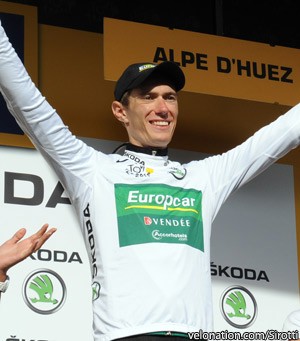Decision to let rider start final stage of Critérium du Dauphiné leads to team punishment
 Reacting to the Europcar team’s decision to allow Pierre Rolland to start the final stage of the Critérium du Dauphiné contrary to its agreed rules, the MPCC [Movement for a Credible Cycling] has announced that it is temporarily suspending the French squad.
Reacting to the Europcar team’s decision to allow Pierre Rolland to start the final stage of the Critérium du Dauphiné contrary to its agreed rules, the MPCC [Movement for a Credible Cycling] has announced that it is temporarily suspending the French squad.
Under MPCC regulations, irregularities in Rolland’s cortisol levels detected on June 9th should have led to an immediate eight day suspension from competition; instead, his team allowed him to start the final stage of the Critérium du Dauphiné, although he withdrew after approximately twenty kilometres.
That decision not to follow the MPCC rules could prove costly; while its suspension from the group may not have direct effects vis-à-vis the race invitations it gets, it is a blow to the team’s image at a time when it is negotiating sponsorship for 2014 and beyond.
Cortisol is a hormone which appears in the body. Abnormal levels can occur for a number of reasons, including the use of corticosteroids. The latter are performance enhancing and their use is consequently strictly controlled in cycling, particularly under MPCC rules.
However as there are other reasons for unusual cortisol levels, the eight day suspension required by the MPCC for riders with this condition is officially deemed a health measure rather than an anti-doping sanction. Rolland completed that time on the sidelines and was allowed to return to racing this week.
Had he simply accepted the eight day suspension, his team would not be in the predicament it finds itself now.
The MPCC states that it received written explanations from team manager Jean René Bernaudeau and team doctor Hubert Long. After studying that, it said that the team would be suspended until the MPCC’s general assembly due to non-compliance with the regulations.
As a result, neither Bernaudeau nor Long can serve on the board of directors of the MPCC. “The strict application of our rules of procedure, on a voluntary basis, is required by all our members, teams, sponsors, teams and / or institutions, national federations, organizers, etc..” it stated.
First requested by the anti-doping group when it was set up in 2007, tests have been carried out by the French federation since last year.
This season 29 riders were tested for cortisol levels in Paris-Nice, with 54 examined in the Four Days of Dunkirk and 42 in the Critérium du Dauphiné.
The Europcar team was previously investigated for the alleged use of cortisone but no wrongdoing was determined. In May 2012 its rider Anthony Charteau was prevented from starting the final stage of the Four Days of Dunkirk, with irregular cortisol levels detected. No official sanction followed.
After the news broke last week of Rolland’s situation, Bernaudeau told L’Equipe that the MPCC doctor Armand Mégret had given the rider the green light on the day in question.
“He was tested at 6.45 am, at sunrise,” he told the French newspaper. “Normally it is necessary to wait half an hour to get reliable results. That was not possible because the start time of the race was very early. We contacted the doctor Armand Mégret and he authorised his start.”
Mégret strongly denied this. “It’s he (Bernaudeau) who said that. I will not make any comments at this time,” he told L’Equipe last Monday, but then went on to make his annoyance clear. “This is completely false and incomprehensible. I’ll leave it at that for now and I will respond in a different way soon. I do not want to do it right now. I find it outrageous and unacceptable. It is already quite a strong response.”
The news of the team’s suspension from the MPCC is the follow-up to that, and is a clear signal that teams who sign up can’t pick and choose the rules to follow.